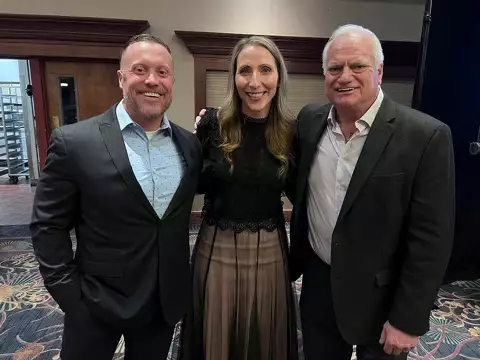
Event Raises Funds and Awareness for Great Lakes Bay Region Mental Health Partnership
While celebrating a state championship victory with the St. Charles High School football team at the Pontiac Silverdome, Ryan Griffus was grappling with a more pressing question: where would he sleep that night?
To the outside world, he was a football hero—strong, happy, and fearless. But in reality, Griffus was struggling with loneliness, depression, fear, and suicidal thoughts.
Now, 25 years later, Griffus, who is the director of the Midland County Juvenile Justice Center, shared his moving story with around 150 people at the Great Hall during the “Lifting Our Voices: Discovering Hope” breakfast fundraiser for the Great Lakes Bay Regional Mental Health Partnership on Friday, Jan. 31.
“Great Lakes Bay Regional Mental Health Partnership is providing the supportive community that I wish I had during those years I felt completely alone. They are doing the most critical and impactful work and truly saving lives,” Griffus said.
The event has raised nearly $50,000 for the partnership so far.
Also speaking at the two-hour gathering was former Detroit Lions quarterback Eric Hipple, a well-known mental health advocate who has supported military veterans and former NFL players after battling mental illness himself.
The free event aimed to raise both awareness and funds for the Great Lakes Bay Regional Mental Health Partnership, which serves Isabella, Midland, Bay, and Saginaw counties. The organization’s vision is “to ensure that everyone knows where to turn for help when struggling with a mental health challenge, seeks help without fear of stigma, and receives prompt access to excellent care.”
The partnership’s initiatives include:
- Advancing Anti-Stigma and Community Culture
- Expanding Workplace and Youth Mental Health Programs
- Enhancing Mental Health Provider Access
Griffus, who spoke for over 30 minutes, described football as easy compared to the challenges he faced growing up. From the age of 12 until 18, he was homeless, living with 21 different families after running away from home to escape his father’s drug dealing and abuse.
He expressed regret that no one ever asked him how he was truly feeling during that time.
“Stigma kept me from letting out what was inside,” Griffus shared. “I never felt more alone in my life for those six years, because nobody knew that dude (inside me). I wish somebody had said, ‘How are you doing, man?’”
It wasn’t until Griffus enrolled at Central Michigan University and took a class on marriage and relationships with Professor Jeff Angera that someone finally reached out to him.
“I had never heard a man talk about being compassionate the way he did. Water was pouring uncontrollably out of my eyes,” Griffus recalled. “He made me feel seen. He gave me a voice.”
Angera, who was in the audience, was grateful to have made a difference for Griffus, admitting he hadn’t realized the depth of what the young man had been going through.
“You just never know how you will impact people,” Angera said.
Hipple Shares His Story
Hipple, who played for the Lions during the 1980s, spoke about his personal struggles with mental health. His mother and aunt had mental illnesses, and during his college years at Utah State University, Hipple became academically ineligible after neglecting his studies due to feeling “not right.”
Though his coaches helped him regain eligibility, Hipple never addressed the underlying issue causing his distress.
Years later, after his football career ended, Hipple attempted suicide by jumping from a moving car. When he woke up in the hospital, stigma kept him from seeking help.
“I said, ‘There’s nothing wrong with me.’ I didn’t want to be ‘that guy,’” Hipple explained. “So I put my blinders back on.”
Tragedy struck when his son, Jeff, 15, began struggling in school. While Hipple was away on business, his wife informed him that their son had died by suicide.
“I just crumbled,” Hipple said.
To numb the pain, Hipple turned to alcohol. His downward spiral continued until he was convicted of drunk driving and jailed for two months. It was then that he sought help at the University of Michigan Depression Center and began acknowledging his struggles.
Hipple posed a question to the audience: why is it that when a friend fails, we support and encourage them, but when we fail ourselves, we become our harshest critics?
“We need unconditional self-acceptance. To fail is also to learn,” he said.
Hipple reflected on the power of encouragement, citing the Lions’ turnaround as a prime example. “The biggest change for the Lions is, someone came in and believed in them, believed in them, believed in them,” he said.
Mental Health First Aid Training
Julia Kepler, a Midland businesswoman and owner of Shop With Moxie, Joyful Tantrum, and Serendipity Road, shared her personal experience with Mental Health First Aid training, offered by the Great Lakes Bay Regional Mental Health Partnership.
This evidence-based course teaches participants how to recognize and respond to mental health or substance use challenges and connect people with the appropriate support.
Kepler recalled an incident when she asked an employee how she was feeling, and the employee revealed that despite her cheerful demeanor, she was feeling suicidal. Kepler encouraged her to reach out to her parents, which ultimately led to her father flying in from Nebraska and helping her find the resources she needed.
“This is the impact that you can make,” Kepler said, addressing the audience.
Dallas Rau, Executive Director of the Great Lakes Bay Region Mental Health Partnership, praised Kepler for sharing her story.
Rau also mentioned a study indicating that people typically wait an average of 10 years before seeking treatment for mental illness.
“Imagine waiting 10 years to seek treatment for diabetes or cancer,” Rau said. “The main reason (that people wait) is stigma.”